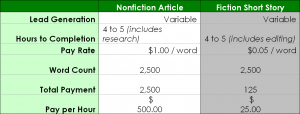Just yesterday, I posted an article about whether or not blogging affects a writer’s ability to write. I’d like to go into a little more detail, and cover my ten ways writers and freelancers can use blogging for marketing their work, building careers, and enhancing their professional “brand” personality. You may (or may not) agree with the points I bring up here, and I will always encourage you to share your feedback.
Blurred deeply behind these ideas, is the notion that a professional writer will understand copyright laws, contracts and, of course, agreements with publishers about what they can and cannot write about. If you’re not aware of these things, please read my When do writers need a copyright? article for more information and stay tuned.
No. 1: Build Excitement for your Upcoming Work
Whether you are freelancing for a newspaper article or you’re knee-deep in a romance novel, blogging about what you’re working on not only gives people an inside glimpse at your writing process, it also “soft-sells” your project. A hidden benefit to “soft-selling” is that readers are more appreciative of someone who doesn’t beat them over the head with the words “buy me.”
No. 2: Allows you to Promote Charity and Good Deeds
What better way to wade through the rants of the blogosphere by contributing something positive and uplifting? I mentioned earlier about Yasmine Galenorn’s contribution to the 2008 online juvenile diabetes auction; other writers have blogged about sites like do one nice thing (every Monday). Being public about community-centric involvements is good PR; even if you don’t feel comfortable talking about your good deeds, you can always admire someone else.
No. 3: Dispels the “Writers are Egotistical and Anti-Social” Myths
There are some of us out there who have days where we want to crawl into a cave with a pen, a notebook, and a flashlight to work furiously on a novel or a project. That doesn’t mean we are all socially-backward or have an ego the size of a small island, however. As I continue to learn through my day job, letting your personality shine through your blog allows agents, publishers, readers and potentially employers see you for who you are.
No. 4: Builds a Writer’s Community
If you think that readers only look exclusively at your work–guess again. Many reviews mention similar authors who write in your vein, or other products customers might be interested in. By exploiting that view, rather than hiding it underneath a stack of books, you take control of that aspect by choosing who you feel is similar. In my opinion, there is no better recommendation for any writer than from his (or her) peer.
No. 5: Encourages Fan/Reader Interaction
Some readers follow a writer’s work from the beginning through until the end. Loyal, buying every book (whether they enjoy it or not), if fans don’t have a destination to go “somewhere” to talk about your work they will create their own. In my opinion, blogs are better to start with for fan interaction simply because low-trafficked forums make you appear unpopular and your books unloved. It’s pretty easy to set up blogs to have someone else manage your comments as well.
No. 6: Mention your Upcoming Appearances and Events
Are you speaking at a local college? Going to a bookstore or convention? Interviewed by a webzine? Promote yourself by talking a little bit about where you’ll be and how readers can get more info to come see you in person. Linking to interviews helps promote other sites, shows you’re appreciative of the nod toward your work, and provides your readers with more info about you.
No. 7: Clarify Misunderstandings More Easily
Every author sometimes experiences a “faux pas” with their work; maybe a blown deadline, maybe a publisher killed the book. By having an official blog, you can support press releases and easily clear up misunderstandings that may occur–especially if your fans or readers only get a snippet of the real story elsewhere.
No. 8: Build your “Author Brand”
In today’s market you’ll hear “Tad Williams writes Aquaman comic” or writer contributes to “George R.R. Martin’s Wild Cards series. Publishers around the entertainment industry have discovered that well-known author names sell. If you, as an author, have any aspiration of sticking around in the industry, a blog can help you build your “author name brand” in the way that you design.
No. 9: Talk about your Interviews and Book Reviews
If you’re promoting yourself through traditional means, then you’re probably being interviewed or encourage reviewers to read and comment on your book. A blog allows you to acknowledge your interviewee and thank your book reviewers, but it also contributes to that overall “soft sell” for your product and your “author brand.”
No. 10: Offers you the Chance to get Instant Feedback
If you don’t have a blog, this point may take time as you build readership. If you do, there is no faster way to put information out there than the internet, especially if you are an author with some “weight.” If you’re curious about what your readers think, and are savvy enough to do it well, then a blog is definitely for you.

